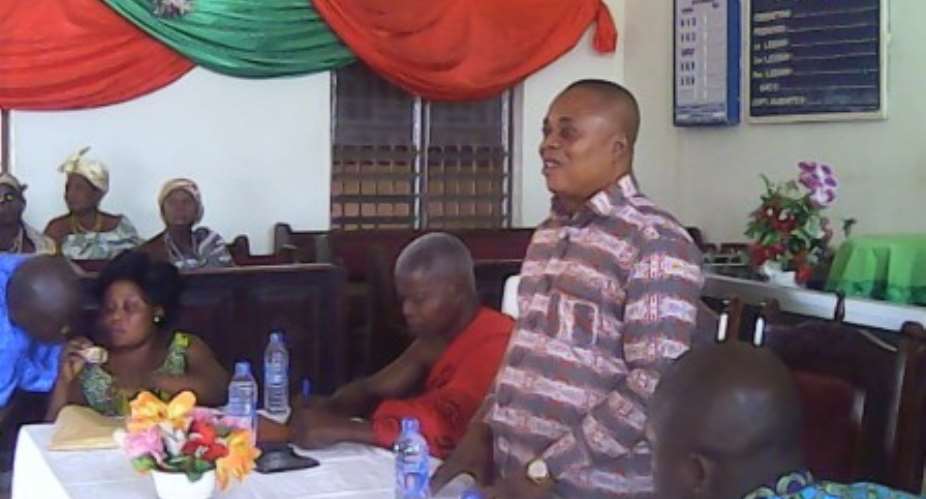Mr. Harry Anthony Attipoe, Registrar of the Greater Accra Regional House of Chiefs, has disclosed that the days when people catch up with chiefs, remove their sandals, and slaughter sheep on their feet to signify their destoolment are over.
According to him, the Chieftaincy Act has made provision for enstoolment and destoolment of chiefs, which, he said, requires that for someone to destool a chief, he ought to go through laid down procedures to achieve that.
The process, Mr. Attipoe indicated, starts from filing a petition to the respective traditional council, if the chief is not a Paramount Chief, or the respective regional house of chiefs, if he is a Paramount Chief.
For example, if the person is a Paramount Chief, after his case has been dealt with and he is not satisfied, he can appeal at the National House of Chiefs, and if he is still not satisfied, he can go to the Supreme Court, where whatever decision that emerges becomes final.
The Registrar of the Greater Accra Regional House of Chiefs made the disclosure at a one-day workshop to train traditional leaders in the Prampram Traditional area at Prampram on Wednesday.
Mr. Attipoe explained that there are about 13 unsettled chieftaincy cases before his office as at the close of 2015.
The cases, as at 2013, were 15, but the House was able to clear only two, thus leaving the backlog of 13 as at the close of 2015.
Mr. Attipoe, who bemoaned the legions of difficulties and challenges such chieftaincy disputes and litigation are causing to developments in the region, said the House thought it prudent to therefore embark on a one month's sensitisation education and exercise in the 12 traditional councils, where almost all of them are faced with such disputes.
He explained that most stakeholders in the region do not understand the installation and de-stoolment processes of chiefs, hence the rampant disputes.
For example, he said, some of the charges leveled against some of the chiefs for their de-stoolment in the region are unfounded, however, as a chieftaincy institution, the weak charges cannot be refused hearing.
The House of Chiefs Registrar observed that cases are delayed for trial, because, often, a member on the panel fails to show up for various reasons, "otherwise, for me, cases could be heard and tried within a month or two. That way, all the backlog of cases could be settled among the parties."
Mr. Attipoe reminded chieftaincy litigants that chieftaincy disputes are not settled in the law courts, saying the most appropriate place for the hearing and settling of such disputes is the chieftaincy institution.
He described it as illegal for any wealthy or a highly educated person to impose himself as the chief of an area, even if that person is a royal.
He, consequently, hoped that all stakeholders would be better informed on the legal processes of the nomination and installation or de-stoolment of chiefs.
That way, chieftaincy disputes will drastically take a nosedive in the region to fast-track development.
The workshop is intended to end in mid February.





 Akufo-Addo commissions Phase II of Kaleo solar power plant
Akufo-Addo commissions Phase II of Kaleo solar power plant
 NDC panics over Bawumia’s visit to Pope Francis
NDC panics over Bawumia’s visit to Pope Francis
 EC blasts Mahama over “false” claims on recruitment of Returning Officers
EC blasts Mahama over “false” claims on recruitment of Returning Officers
 Lands Minister gives ultimatum to Future Global Resources to revamp Prestea/Bogo...
Lands Minister gives ultimatum to Future Global Resources to revamp Prestea/Bogo...
 Wa Naa appeals to Akufo-Addo to audit state lands in Wa
Wa Naa appeals to Akufo-Addo to audit state lands in Wa
 Prof Opoku-Agyemang misunderstood Bawumia’s ‘driver mate’ analogy – Miracles Abo...
Prof Opoku-Agyemang misunderstood Bawumia’s ‘driver mate’ analogy – Miracles Abo...
 EU confident Ghana will not sign Anti-LGBTQI Bill
EU confident Ghana will not sign Anti-LGBTQI Bill
 Suspend implementation of Planting for Food and Jobs for 2024 - Stakeholders
Suspend implementation of Planting for Food and Jobs for 2024 - Stakeholders
 Tema West Municipal Assembly gets Ghana's First Female Aircraft Marshaller as ne...
Tema West Municipal Assembly gets Ghana's First Female Aircraft Marshaller as ne...
 Dumsor is affecting us double, release timetable – Disability Federation to ECG
Dumsor is affecting us double, release timetable – Disability Federation to ECG
